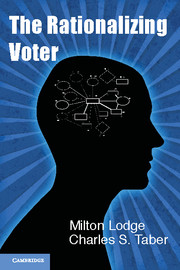Crossref Citations
This Book has been
cited by the following publications. This list is generated based on data provided by Crossref.
Chong, Dennis
and
Junn, Jane
2011.
Cambridge Handbook of Experimental Political Science.
p.
320.
Hopkins, Daniel J.
2012.
The Exaggerated Life of Death Panels: The Limits of Framing Effects in the 2009-2012 Health Care Debate.
SSRN Electronic Journal,
Kahan, Dan M.
Jenkins-Smith, Hank C.
Tarantola, Tor
Silva, Carol L
and
Braman, Donald
2012.
Geoengineering and the Science Communication Environment: A Cross-Cultural Experiment.
SSRN Electronic Journal,
Hopkins, Daniel J.
and
Ladd, Jonathan McDonald
2012.
The Consequences of Broader Media Choice: Evidence from the Expansion of Fox News.
SSRN Electronic Journal,
Kahan, Dan M.
Peters, Ellen
Dawson, Erica Cantrell
and
Slovic, Paul
2013.
Motivated Numeracy and Enlightened Self-Government.
SSRN Electronic Journal,
Tritt, Shona M.
Inzlicht, Michael
Peterson, Jordan B.
and
Denson, Tom
2013.
Preliminary Support for a Generalized Arousal Model of Political Conservatism.
PLoS ONE,
Vol. 8,
Issue. 12,
p.
e83333.
LaCour, Michael J.
2013.
A Balanced News Diet, Not Selective Exposure: Evidence from a Direct Measure of Media Exposure.
SSRN Electronic Journal,
Gottfried, Jeffrey A.
Hardy, Bruce W.
Winneg, Kenneth M.
and
Jamieson, Kathleen Hall
2013.
Did Fact Checking Matter in the 2012 Presidential Campaign?.
American Behavioral Scientist,
Vol. 57,
Issue. 11,
p.
1558.
Bolsen, Toby
Druckman, James N.
and
Cook, Fay Lomax
2014.
How Frames Can Undermine Support for Scientific Adaptations: Politicization and the Status-Quo Bias.
Public Opinion Quarterly,
Vol. 78,
Issue. 1,
p.
1.
Johnston, Christopher D.
and
Ballard, Andrew
2014.
Economists and Public Opinion: Expert Consensus and Economic Policy Judgments.
SSRN Electronic Journal,
Druckman, James N.
2014.
Pathologies of Studying Public Opinion, Political Communication, and Democratic Responsiveness.
Political Communication,
Vol. 31,
Issue. 3,
p.
467.
Erisen, Cengiz
Lodge, Milton
and
Taber, Charles S.
2014.
Affective Contagion in Effortful Political Thinking.
Political Psychology,
Vol. 35,
Issue. 2,
p.
187.
Kimball, Spencer H.
Levy, Ting
Venturelli, Henry
and
Miller, Sophie
2014.
Interactive Voice Recognition Communication in Electoral Politics.
American Behavioral Scientist,
Vol. 58,
Issue. 9,
p.
1236.
Hibbing, John R.
Smith, Kevin B.
and
Alford, John R.
2014.
Differences in negativity bias underlie variations in political ideology.
Behavioral and Brain Sciences,
Vol. 37,
Issue. 3,
p.
297.
Tritt, Shona M.
Inzlicht, Michael
and
Peterson, Jordan B.
2014.
Confounding valence and arousal: What really underlies political orientation?.
Behavioral and Brain Sciences,
Vol. 37,
Issue. 3,
p.
330.
Huckfeldt, Robert
2014.
Networks, Contexts, and the Combinatorial Dynamics of Democratic Politics.
Political Psychology,
Vol. 35,
Issue. S1,
p.
43.
Leeper, Thomas J.
and
Slothuus, Rune
2014.
Political Parties, Motivated Reasoning, and Public Opinion Formation.
Political Psychology,
Vol. 35,
Issue. S1,
p.
129.
Jungherr, Andreas
2014.
Twitter in Politics: A Comprehensive Literature Review.
SSRN Electronic Journal,
Gibson, James L.
Lodge, Milton
and
Woodson, Benjamin
2014.
Losing, but Accepting: Legitimacy, Positivity Theory, and the Symbols of Judicial Authority.
Law & Society Review,
Vol. 48,
Issue. 4,
p.
837.
Lawrence, Eric D
and
Sides, John
2014.
The consequences of political innumeracy.
Research & Politics,
Vol. 1,
Issue. 2,



